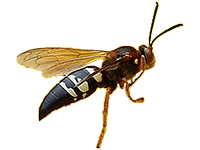
Cicada Killer Wasps
Large, solitary, cicada-hunting wasps.
Facts & Information
Cicada Killer Wasps
(Sphecius)
¾ – 2 inches Long
Active Months:
July – September
Not Aggressive
Insect Quantity:
1 – 3 Wasps per hole
Insect Colors


Cicada Killer Behavior:
Cicada Killer Wasps are solitary wasps and appear during the summer months. Cicada Killers is also known as a digger wasps. These wasps are large and can be intimidating, but are not aggressive like other wasps like yellow jackets in the social wasp category. They pollinate plants and are considered beneficial.
The Cicada Killer Wasps will gravitate towards flowers, feeding on flower nectar. These wasps dig holes or burrows, preferably in a soft, sandy and well-drained soil. They may be found on sloped terrains, in flower beds, along with patio edges or sidewalks, as well as in the yard. The Cicada Killer Wasp stings Cicada (locusts) to paralyze them and feed them to the larvae. Many of the developing larvae may come out as adults the following year. The adult Cicada killers feed on flower nectar. Cicada Killer Wasps do not defend their nests like yellow jackets, which are social wasps.
How Serious Are Cicada Killer Wasps?
Cicada killer wasps, while intimidating in appearance, are generally not considered serious threats to humans. These solitary wasps are focused on hunting cicadas to provision their nests and rarely show aggression towards people unless directly provoked or handled. However, their large size and buzzing flight can cause anxiety for some individuals. Additionally, the presence of cicada killer wasps can be alarming, especially if their nesting activity occurs near high-traffic areas or playgrounds. While their stings are painful, cicada killer wasps are not as aggressive as social wasps or hornets. Effective management strategies, including professional removal of nests and education about their behavior, can help alleviate concerns and ensure a harmonious coexistence with these beneficial insects.
Why call a professional to remove Cicada Killers?
Calling a professional for the removal of cicada killer wasps is advisable due to the potential risks involved and the specialized knowledge required for effective management. While cicada killer wasps are generally not aggressive toward humans, they can pose a threat if their nests are disturbed or if individuals inadvertently come into contact with them. Professional pest control experts have the expertise to accurately identify cicada killer wasp nests and employ appropriate removal techniques to minimize the risk of stings and ensure the safety of occupants. Additionally, professionals can offer advice on preventive measures to discourage future infestations, providing homeowners with peace of mind knowing that their property is free from these potentially harmful insects.




Our Cicada Killer Wasp Treatment Process:
Rockland Bee Removal will come treat the holes in your lawn where the wasps are nesting in. We will apply an insect dust that will eliminate the wasps. It’s important to understand that every day there will be pupae hatching replacing the wasps that die from our treatments. This happens for about 2-4 weeks every spring and early summer. Basically there are a bunch of pupae in the ground from last year’s nests which overwintered. These pupae will release the adults every spring and summer and when they emerge, their goal is to mate and continue their species by creating new nests in your yard.
So when we dust, we will be killing the currently hatched population. The dust will take effect immediately but in general, it’s not uncommon to see new holes within 5-7 days as more pupae hatch.
THIS DOESN’T MEAN THE PREVIOUS TREATMENT DIDN’T WORK; IT JUST MEANS WE NEED TO DUST AGAIN!!
If you would like to treat your home for cicada killer activity, Rockland Bee Removal can provide a single treatment to eliminate the existing females from your property. But because male cicada killers do not create nests in the ground, there is no guarantee that the males will stop free-flying. The holes in the ground created by the females will be treated individually. It is important to note that this treatment can only be performed once to treat existing holes. RBR cannot guarantee this service beyond the initial treatment because new holes can be created from new cicada killer populations that find their way onto your property. If you would like us to come down again there will be an additional charge.
Call us 845-445-8273

Need Cicada Killer Treatment at your location?
Encountering cicada killer wasps activity around your property? If you’ve observed these insects frequenting a particular area, capture a photo of the wasps and their nest location for accurate identification of the infestation. Easily share the images by texting them to 845-445-8273 or submitting a removal request HERE. While we strive to offer the best advice possible, sometimes there may be limited options. Contact us today to discuss your situation and determine the best course of action for your property’s safety and peace of mind.
Not Sure What Type of Bees You Have?
If you see bees coming and going from an opening in your home or yard, take a picture of the bees as well as the location where they are so we can positively identify the type of bees and text the pictures to 845-445-8273 or send us a bee removal request HERE.
Image Gallery

















